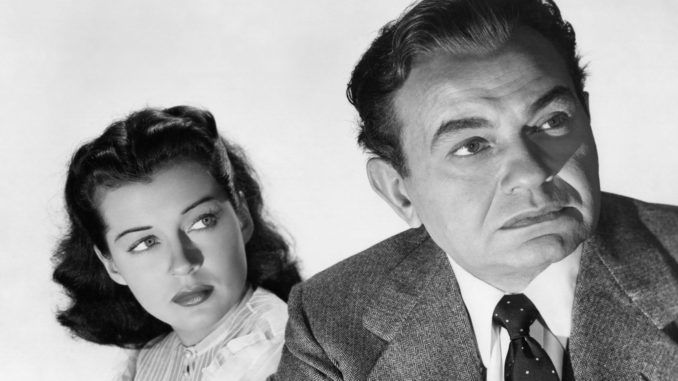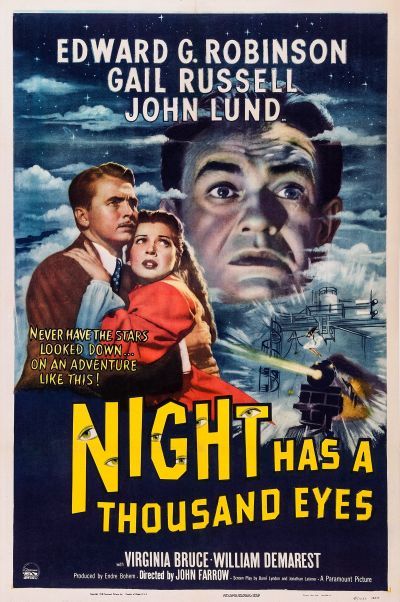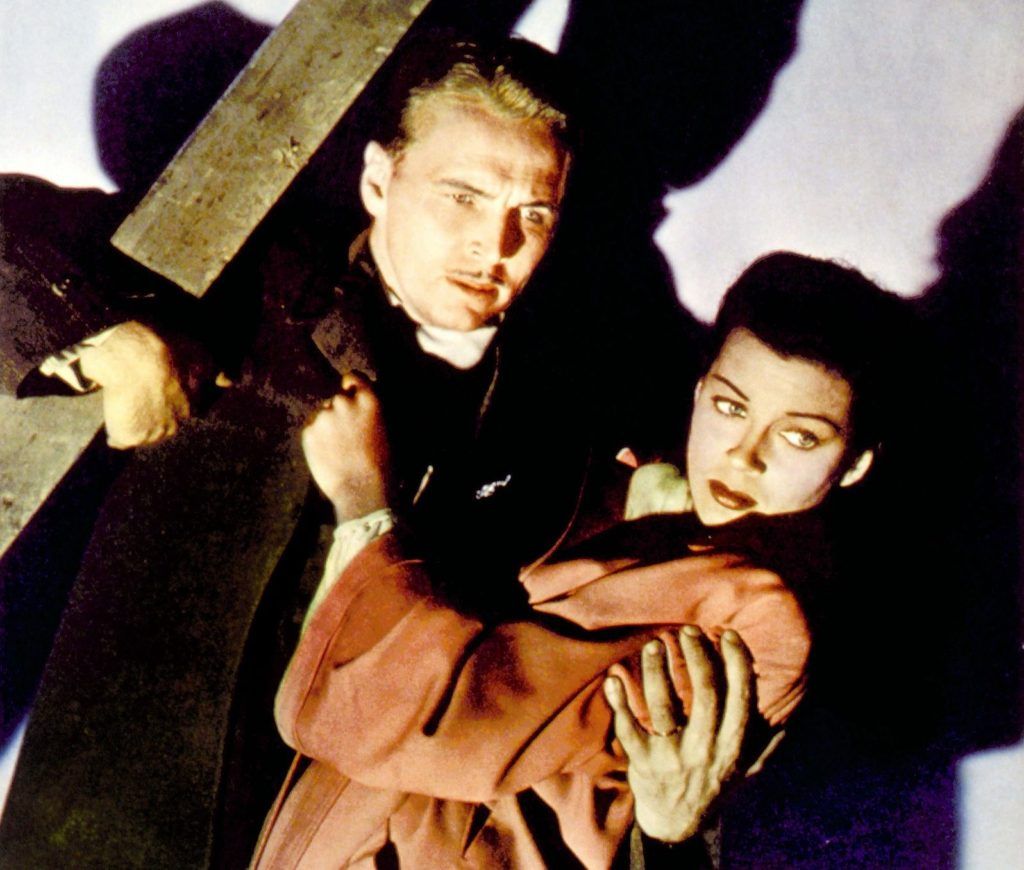
Rating: C+
Dir: John Farrow
Star: Edward G. Robinson, Gail Russell, John Lund, William Demarest
This is the other case for our feature, where I’d already reviewed the best-rated qualifying movie of the year. In 1948, that was Abbott and Costello Meet Frankenstein, and is probably a good thing. It’s likely a better fit for the vampire feature which included it than this, because of its utter refusal to take the genre elements seriously. That isn’t an issue here. It may be somewhat fringey as horror goes – Night is certainly more like a horror noir – but you cannot accuse it of playing for laughs. It begins with a young woman attempting suicide, and ends with a man being gunned down by the police. There’s not much light in between these bookends.
The title is probably most connected in pop culture to Bobby Vee’s perky little pop tune from 1962. Though if you listen to the lyrics, it’s rather darker in content, and quite stalker-y. “If you put me down for another, I’ll know, believe me, I’ll know. ‘Cause the night has a thousand eyes, and a thousand eyes can’t help but see, if you aren’t true to me.” Very Every Breath You Take. The phrase itself dates back far earlier than the film, to a poem by 19th-century writer, Francis William Bourdillon, published in 1899:
The night has a thousand eyes,
And the day but one;
Yet the light of the bright world dies
With the dying sun.
 While the “eyes” are the same in this movie – representing the stars in the sky – the context is more threatening, being part of a premonition of death experienced by John Triton (Robinson). Twenty years earlier, he was a fake medium, travelling the country and doing stage shows in which he made predictions with the help of two assistants. One night, he had a genuine vision, which comes to pass, and this new ability lets him foresee horse races and stock movements, profiting as a result. However, he also sees death, and whether he tells the subject or not doesn’t make a difference. After a vision involving one assistant, he gives up the stage life, and parts company with them. Although they marry each other, the predicted tragedy still unfolds.
While the “eyes” are the same in this movie – representing the stars in the sky – the context is more threatening, being part of a premonition of death experienced by John Triton (Robinson). Twenty years earlier, he was a fake medium, travelling the country and doing stage shows in which he made predictions with the help of two assistants. One night, he had a genuine vision, which comes to pass, and this new ability lets him foresee horse races and stock movements, profiting as a result. However, he also sees death, and whether he tells the subject or not doesn’t make a difference. After a vision involving one assistant, he gives up the stage life, and parts company with them. Although they marry each other, the predicted tragedy still unfolds.
Back in the present, he has a premonition about the survivor, now a rich businessman, dying in a plane crash. He reaches out to his former assistant’s daughter, Jean Courtland (Russell), too late to do anything and her father duly perishes. Jean’s boyfriend, Elliott Carson (Lund), is very suspicious of Triton, believing he had a hand in the accident. The next premonition involves John seeing Jean dying on a clear night, under the stars. She doesn’t take well to hearing this, for obvious reasons, driving her to a suicide attempt, stopped by Elliott in the film’s opening scene (below). Elliott goes to the cops, where Lieut. Shawn (Demarest) tells him the plane had been tampered with. But Triton has further visions, perhaps reflecting his own death. Who will be fated to… er, meet their fate?
This was based on a novel with the same name by Cornell Woolrich, writing as George Hopley, and published in 1945. In the book, it’s a detective who stops the young woman from killing herself. But the concept of a fraudulent psychic suddenly discovering he has a genuine ability to see what he has previously pretended, pre-dates even the novel. There’s a 1935 British film, The Clairvoyant (released in the US, in an edited version, as The Evil Mind), which also uses the idea. In it, Claude Rains plays the central role, with the twist being that he only has a genuine talent in the presence of a particular woman – who is not his wife (Fay Wray). Of course, the most famous example of the trope is probably Whoopi Goldberg in Ghost, albeit played there largely for comedic effect.
There’s no question that the best thing about this is Robinson. He’s most well-known for his roles in gangster movies, such as Little Caesar, or opposite Humphrey Bogart in Key Largo – made the same year as Night. Robinson showcases a very different side of his acting talents here, playing a man tortured by an unwanted ability. Triton is resolute in his desire to do the right thing, yet appears powerless to do anything, against the apparently implacable hand of fate. He’s considerably more interesting than both the nominal hero, Elliott, who is bland and thoroughly dull. Makes him a good fit for Jean though, since she’s fairly forgettable, and has little or no agenda of her own. The only actor to match Robinson is Demarest, whose cop has a nice line in acerbic responses:
“Then, it’s murder!”
“It ain’t table tennis…”

Certain elements of the plots are no great shakes either. There are some missing stock options which turn out to be more significant than I wanted, and feels like a weak explanation. Then, towards the end, the script throws a wild animal escaping from a zoo into the mix. This is blatantly just to muddy the waters a bit, because Triton’s vision of Jean’s death showed her lying at the feet of a lion. I sincerely doubt anyone in the contemporary audience was fooled by this obvious red herring. Given the powerhouse performance from Robinson, I’m left feeling he deserved a better script built around his character.
You can argue whether or not this should be considered as horror. The noir elements are strong, not least in Lieutenant Shawn and the police, and some places do call it a thriller. On the other hand, it wouldn’t work without the paranormal or supernatural elements. The idea of trying to change the future and cheat death, has also been a horror staple, all the way through to Final Destination. Is knowing your fate worse than unexpectedly encountering it? Anyone who has ever been left waiting for the results of a medical test might have a strong opinion on that topic. I think I’d rather go peacefully in my sleep.
This article is part of our October 2025 feature, 31 Days of Vintage Horror.
